7 reasons you need binoculars: from soaring eagles to roaring avalanches
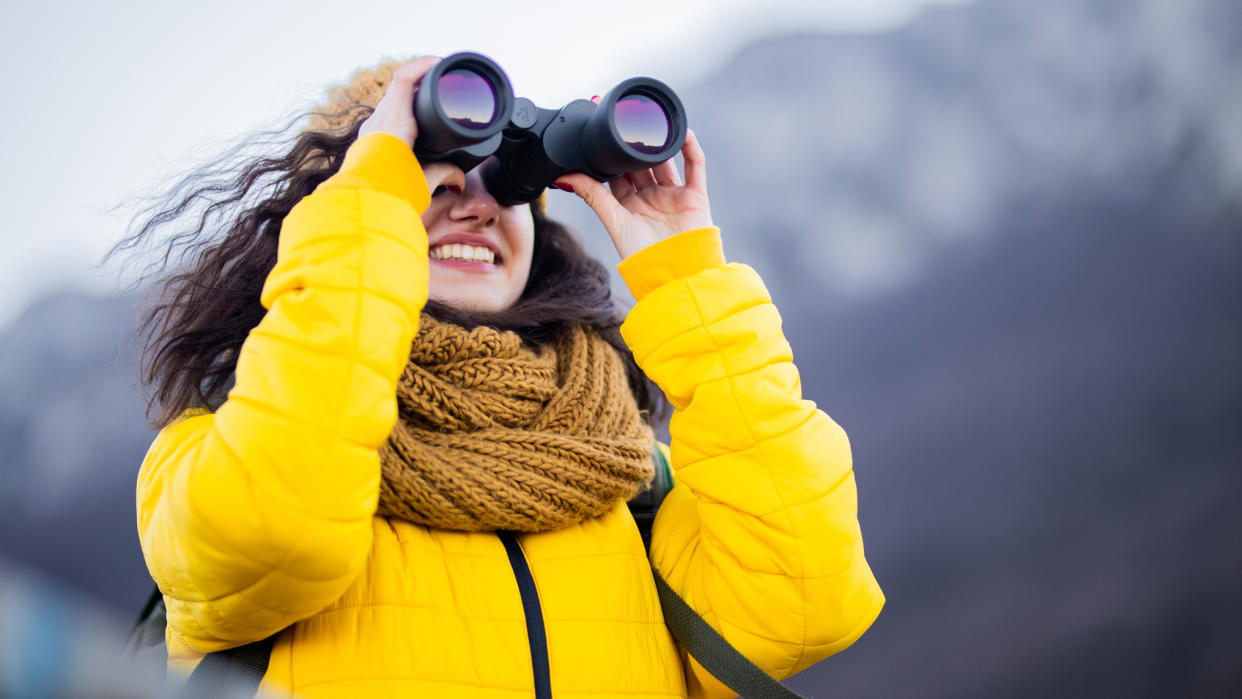
There are many reasons you need binoculars for your outdoor adventures. The most obvious is to enhance those encounters with wildlife, yet they also add to the stargazing experience on a wild camp, bring enjoyment when hiking or camping with kids and can be of great assistance to climbers and mountaineers when route finding.
Of course, wildlife encounters can be the most memorable moments of any hike. I remember scrambling my way up to the summit of Blà Bheinn, a magnificent mountain on Scotland’s Isle of Skye. I’d heard that a pair of golden eagles were known to nest somewhere in the cliffs but I didn’t expect or hope to see one. In truth, I was there for the mountain, not its inhabitants.
Towards the top, I suddenly became aware of a presence above me and craned by neck upwards. The sight of a large raptor gliding above me, close enough that I could sense the intelligence in its eyes, took my breath away. It was only that close for a moment. Within seconds it was diving into the great void of Glen Sligachan, backed by the jagged spires of the Black Cuillin range. Having lost site of the bird as it stooped, I ran to a rock outcrop and caught sight of it once more. The now distant shape soared far below and I watched it for several priceless moments, before it was out of sight.
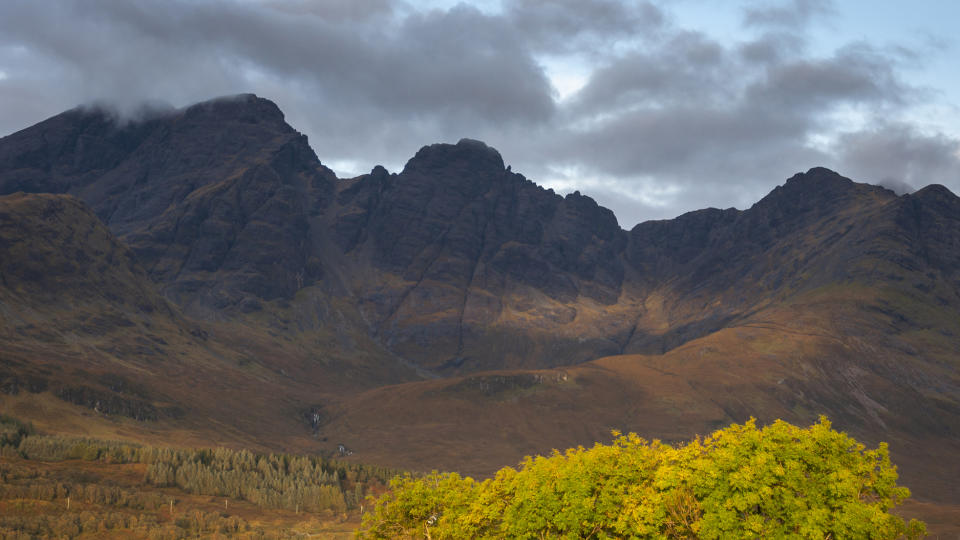
As magical as this was, it would have been even more spectacular if I’d have had a pair of binoculars to hand, as beyond the initial encounter, the detail of the eagle’s beauty was lost to me. This, as much as any experience I’ve had, is a good lesson in why you should carry binoculars on every adventure. So, without further ado, here are seven reasons you need binoculars for your outdoor exploits.
Meet the expert
Today's best deals
1: to enjoy wildlife from the trail
Binoculars are perfect for studying the stunning wildlife the backcountry has to offer
They'll help you advance your knowledge of the nature around you
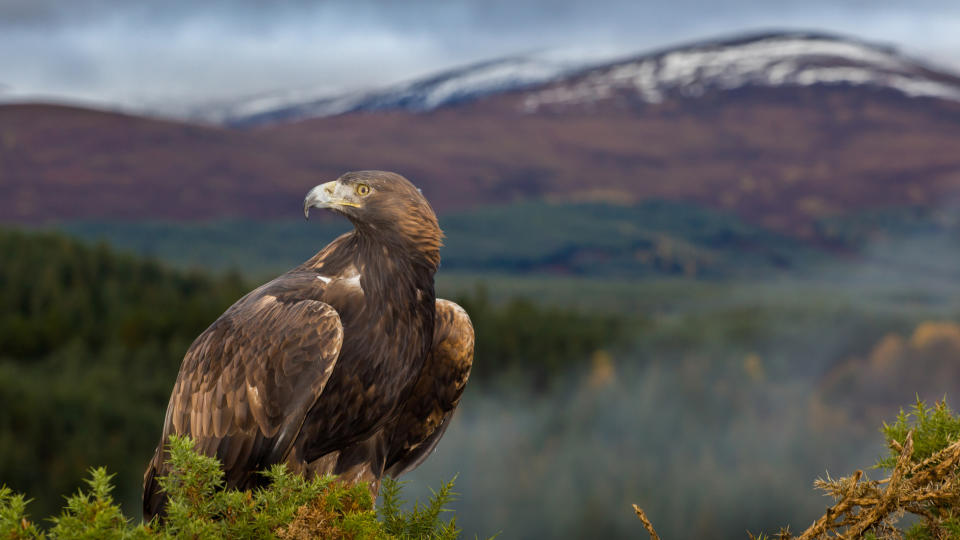
The herd of scampering deer across the fells; the dolphins leaping in the blue, far below your cliff-edge trail; the grizzly bear stalking the opposite side of the river; a murmuration of starlings weaving ethereal patterns into the twilight sky – all of these sights can be magnified and brought into wonderful focus with a pair of binoculars.
As well as enhancing your wildlife viewing, binoculars enable you to better identify and add to your knowledge of the natural world, adding a whole new dimension to any hiking or camping trip. Suddenly, every time you venture outdoors, there’s added interest, whether you're just popping to the local park or taking on a Colorado 14er.
2: to marvel at dynamic forces
Binoculars can give you a new view of phenomena like geysers, avalanches, volcanic eruptions and collapsing glaciers
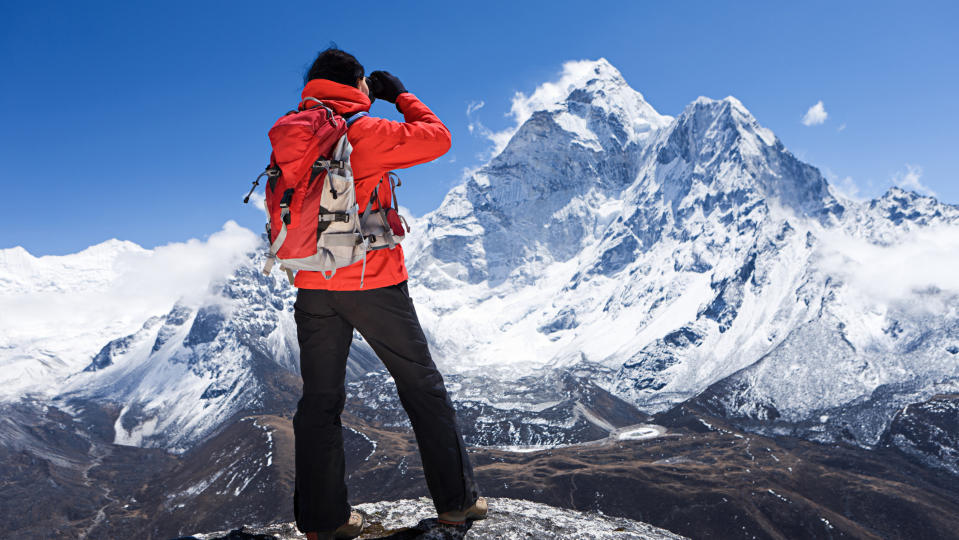
It’s not just biology that brings spectacular sights to the trail, the laws of physics can also conspire to deliver jaw-dropping moments. In the mountains, you can marvel at spectacular waterfalls or plumes of spindrift liberated by the wind on a neighbouring ridge; or witness the power of an avalanche or rockfall from a safe distance. If you’re hiking in volcanic regions, you can view geysers erupting from afar or admire the otherworldly sight of an active volcano. Where glaciers meet the sea, you might be lucky enough to catch the awesome sights of tons of ice collapsing into the water.
3: to zoom in on little critters
Close focussing binoculars are great for looking at plants and little critters
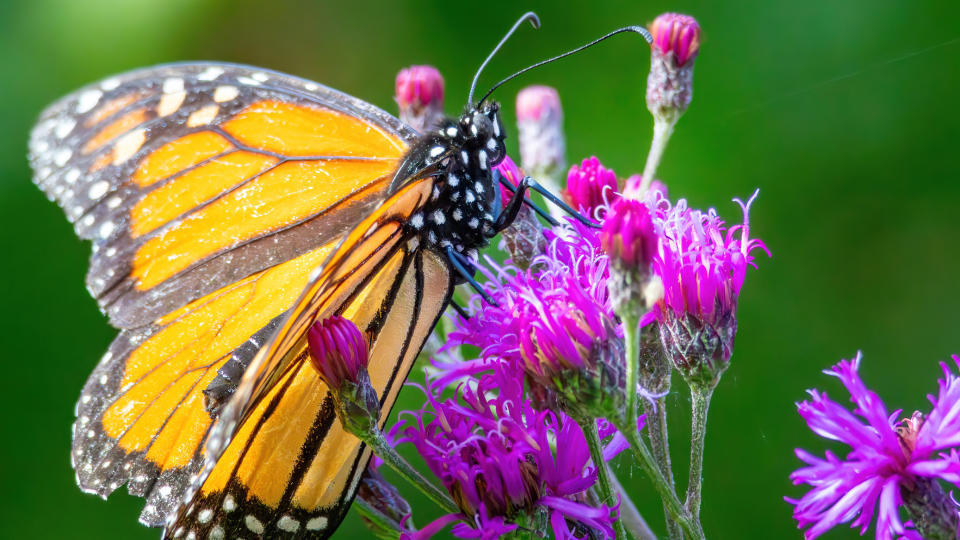
When it comes to binoculars, we usually think of their ability to bring distant objects into view, yet they are also very handy for studying the tiny world beneath our feet, which can be just as fascinating as any habitat. Some pairs, such as the Kowa BD32-8XD, are close focussing, meaning they’re ideal for viewing butterflies and invertebrates.
4: to gaze at the heavens
A pair of binoculars reveal the night sky in glorious detail
Objects of particular interest are the Moon, Saturn and Jupiter
It's worth getting a tripod to keep your image steady
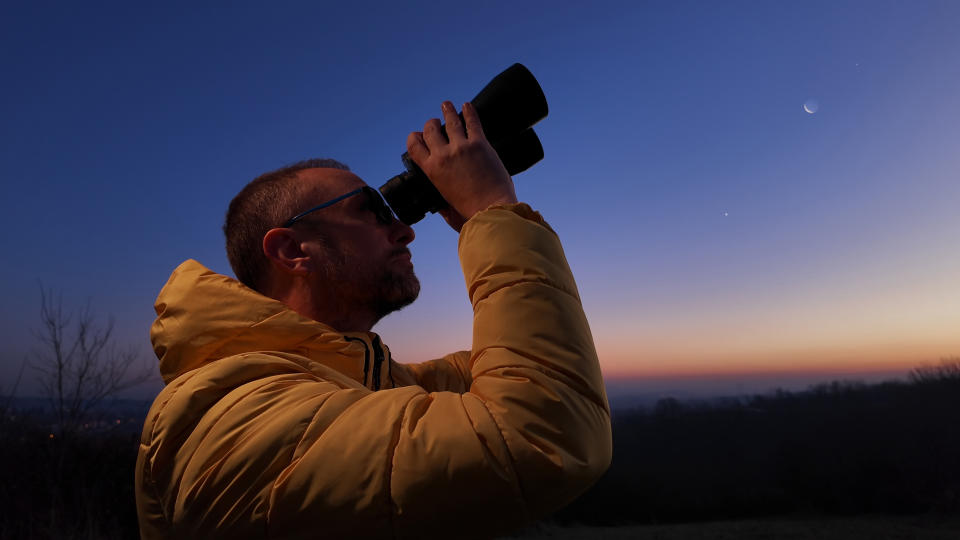
For me, one of the main draws of wild camping is to escape the hustle and bustle of urban life and venture out into an untamed landscape, a place where nature still has dominion. The magnificent colors that sunset or sunrise paints across the hills are undoubted highlights, revealing the landscape in a whole new light. Yet on a clear night, nothing compares to the show put on by our celestial neighbours in the northern hemisphere night sky.
A pair of binoculars reveal staggering detail to many of the night sky’s treasures. This is especially so for dedicated stargazing bins, like Celestron’s Skymaster 15x70. However, any pair will enhance your cosmic viewing experience.
The moon is a particularly beguiling object to study. While it’s interesting to observe with the naked eye, when magnified its many surface features really come to life. The shadows cast on its cratered surface give a sense of scale and you’ll really feel that you’re studying another world. The only downside of a full (or near to full) moon is that its light can drown out the detail in the rest of the night sky.
Other celestial objects that binoculars reveal in much more detail are Jupiter and its four Galilean moons, the ringed jewel of Saturn, and the International Space Station when it zooms across the night sky. Top billing has to go to Jupiter and its moons; it really hits home that you’re looking at a gigantic gas giant orbited by other worlds. Through binoculars, Saturn still looks nothing like the images captured by the Cassini mission, though you do get a sense of its ringed form.
It's worth getting a tripod if you’re looking to study the night sky at length, as it will help you to keep the images stable.
5: to enjoy the exploits of others
With binoculars, you can watch distant climbers male their way up a crag
Places like Kleine Scheidegg beneath the Eiger and El Cap meadows in Yosemite are well known spots for watching climbing exploits
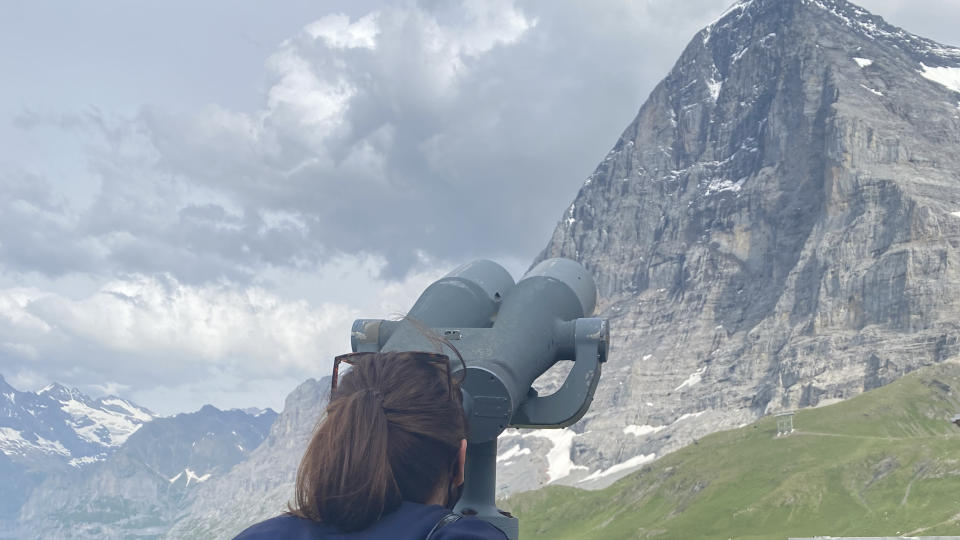
It can be quite a thrilling moment when you spot a couple of plucky climbers scaling a cliff face from the trail. If you’re with others, you’ll probably point them out.
“Look there, just below that overhanging section.”
“Nope, can’t see them.”
“One of them’s in red, the other’s in blue. Just to the left of that quartzite band.”
“Oh yeah! There they are.”
This is usually where the excitement ends. You’ve spotted them, they’re quite a long way off, you’ve got a hike to get on with. However, with a pair of binoculars, you can transform the distant spectacle into something much more engrossing, following the climbers’ every move.
It’s perhaps climbs on the classic big walls of the world that are the most riveting to view through bins. During the early days of climbing on the infamous North Face of the Eiger in the Alps, crowds used to gather in Kleine Scheidegg, at the foot of the mountain, to monitor the progress of brave attempts on the unclimbed face. In the US, rock climbing in Yosemite is very much a spectator sport. On a good day, take a stroll through El Cap meadows and you’re bound to see plenty of people with their bins focussed on tiny climbers taking on the huge face.
Climbers generally make slow progress, which is why they’re easy to view through binoculars. However, you can also magnify the exploits of anyone enjoying the mountains, be they trail runners, scramblers or paragliders.
6: to study the way ahead
Binoculars are useful for getting a closer look at the route you intend to climb
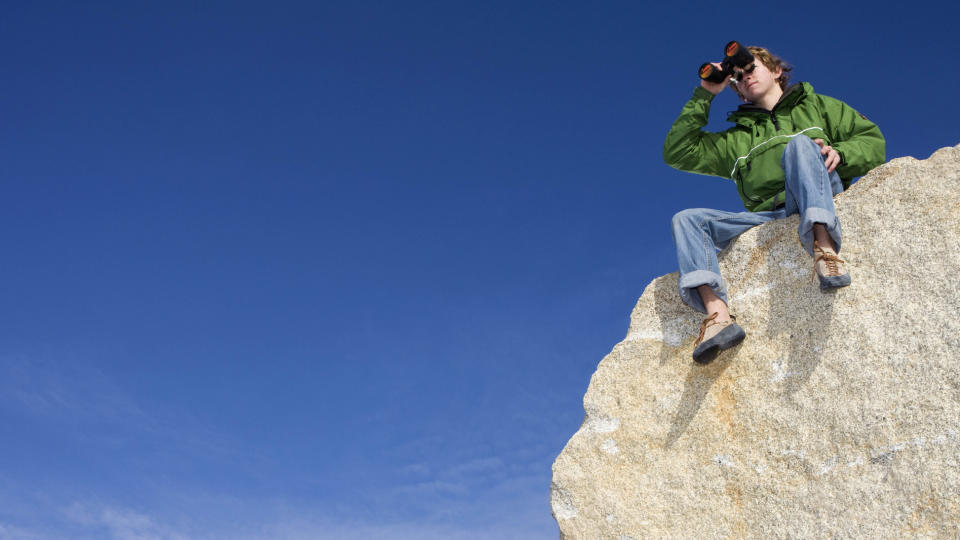
In this reason, you’re no longer the spectator, you’re now the climber, the mountaineer – you are the explorer. Binoculars are an essential piece of kit for any self-respecting explorer, along with an Indiana Jones style fedora hat and a map and compass. The reason for this is that they allow you study the way ahead.
For a climber, binoculars provide insights into potential routes as you advance towards the crag in your approach shoes. Locating the foot of a chosen route can sometimes be as taxing as the climb itself, which is why bins are so useful during the approach. Similarly, mountaineers can study the conditions of their chosen ascent, whether it’s a winter mountaineering line or an ice climb that may or may not have come into good nick.
7: to share the excitement with others
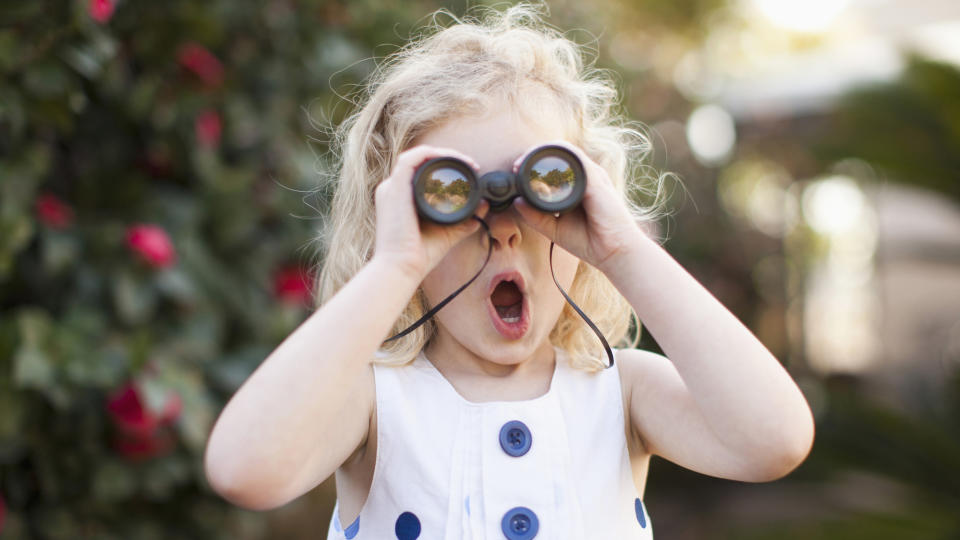
Giving children a pair of binoculars adds a layer of interest when hiking or camping
Bringing a pair of binoculars along when hiking or camping with kids can add a whole layer of interest. In fact, we champion the Kowa YF 8x30 binoculars as the perfect pair to give to burgeoning field biologists and geologists. Teach them how to use binoculars for themselves and you might just spark a lifelong interest.
It’s a good idea to print out or source a classification chart for the local wildlife to get them identifying the animals they find. When the sun goes down, they’ll love studying the Moon and Jupiter just as much as we do.

